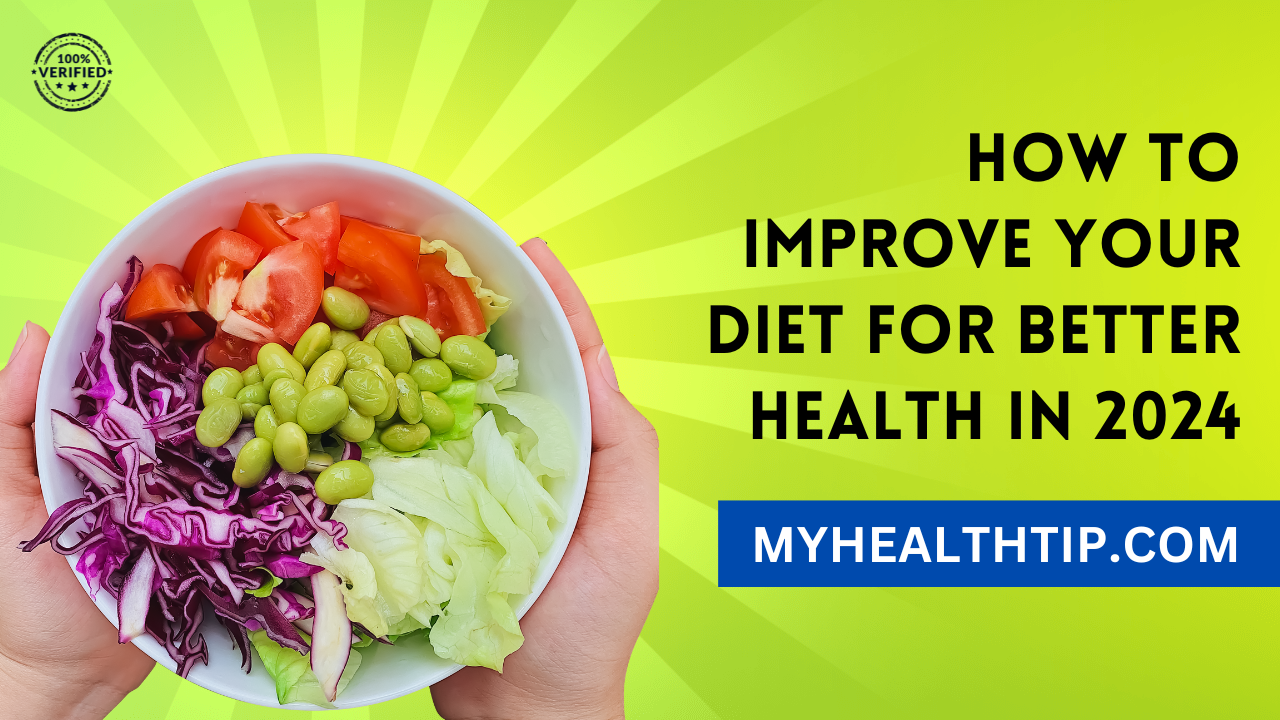Table of Contents
Improve Your Diet for Better Health in 2024
Improving your diet is one of the most effective ways to enhance your overall health and well-being. With 2024 upon us, it’s the perfect time to reassess your eating habits and make necessary changes to ensure a healthier future. This article provides practical and sustainable healthy eating tips and emphasizes the importance of nutrition for better health.
Why Improving Your Diet Matters
A balanced diet is crucial for maintaining good health, preventing chronic diseases, and supporting overall well-being. By focusing on improving your diet, you can boost your energy levels, enhance your immune system, and improve your mental health. Here are some key reasons to prioritize nutrition for better health:
- Weight Management: A healthy diet helps you maintain a healthy weight, reducing the risk of obesity-related conditions such as heart disease, diabetes, and certain cancers.
- Disease Prevention: Proper nutrition supports your body’s natural defense mechanisms, reducing the risk of chronic illnesses.
- Energy Levels: Eating the right foods provides the necessary fuel for your body, keeping you energized throughout the day.
- Mental Health: Good nutrition positively impacts brain function, reducing the risk of mental health issues like depression and anxiety.

Healthy Eating Tips to Improve Your Diet
1. Eat a Variety of Foods
Diverse food choices ensure you get a wide range of nutrients essential for health. Incorporate the following into your diet:
- Fruits and Vegetables: Aim for at least five servings of fruits and vegetables daily. They are rich in vitamins, minerals, and fiber.
- Whole Grains: Choose whole grains over refined grains. Whole grains like brown rice, oats, and quinoa provide more nutrients and fiber.
- Lean Proteins: Include a variety of protein sources such as poultry, fish, beans, lentils, and nuts to support muscle health and repair.
- Healthy Fats: Opt for healthy fats found in avocados, nuts, seeds, and olive oil. These fats support heart health and brain function.
2. Limit Processed Foods
Processed foods often contain high levels of added sugars, unhealthy fats, and sodium. Reducing your intake of these foods can significantly improve your diet and overall health. Here are some tips:
- Read Labels: Always check food labels for added sugars, unhealthy fats, and high sodium content.
- Cook at Home: Preparing meals at home allows you to control the ingredients and make healthier choices.
- Choose Whole Foods: Opt for whole, unprocessed foods whenever possible. Fresh fruits, vegetables, and whole grains are excellent choices.
3. Stay Hydrated
Proper hydration is essential for maintaining bodily functions and overall health. Water is the best choice for staying hydrated, but you can also include other healthy beverages:
- Water: Aim to drink at least eight glasses of water a day.
- Herbal Teas: These are a great way to stay hydrated and can offer additional health benefits.
- Limit Sugary Drinks: Reduce your intake of sugary sodas, energy drinks, and high-sugar fruit juices.
4. Practice Portion Control
Eating the right amount of food is just as important as eating the right types of food. Portion control can help you manage your weight and prevent overeating. Here are some healthy eating tips for portion control:
- Use Smaller Plates: This can help you eat smaller portions without feeling deprived.
- Listen to Your Body: Eat when you are hungry and stop when you are full. Avoid eating out of boredom or stress.
- Mindful Eating: Take your time to eat and savor your food. This helps you recognize when you are full and reduces overeating.
5. Plan Your Meals
Planning your meals ahead of time can help you make healthier choices and avoid unhealthy last-minute decisions. Here are some tips for meal planning:
- Weekly Plans: Create a weekly meal plan that includes a variety of foods from all food groups.
- Prepare Ingredients: Pre-cut vegetables, cook grains, and portion out snacks to make healthy eating more convenient.
- Balanced Meals: Ensure each meal contains a balance of protein, carbohydrates, and healthy fats.

6. Include Fiber-Rich Foods
Fiber is essential for digestive health and can help you feel full, reducing the likelihood of overeating. To improve your diet, include more fiber-rich foods:
- Whole Grains: Choose brown rice, whole wheat pasta, and whole grain bread.
- Fruits and Vegetables: These are naturally high in fiber and provide essential vitamins and minerals.
- Legumes: Beans, lentils, and chickpeas are excellent sources of fiber and protein.
7. Incorporate Healthy Snacks
Snacking can be a part of a healthy diet if done correctly. Choose snacks that provide nutrition for better health rather than empty calories:
- Nuts and Seeds: These are rich in healthy fats, protein, and fiber.
- Fresh Fruit: An excellent way to satisfy sweet cravings while providing essential nutrients.
- Vegetable Sticks with Hummus: A great combination of fiber and protein.
8. Reduce Sugar Intake
High sugar intake is linked to various health issues, including obesity, diabetes, and heart disease. To improve your diet, try these tips:
- Limit Sugary Drinks: Choose water, herbal teas, or black coffee instead of sodas and sweetened beverages.
- Read Labels: Look for hidden sugars in processed foods and choose those with little or no added sugars.
- Natural Sweeteners: Use fruits, honey, or maple syrup in moderation instead of refined sugars.
9. Balance Macronutrients
A balanced diet includes the right proportion of macronutrients – carbohydrates, proteins, and fats. Here’s how to achieve that balance:
- Carbohydrates: Choose complex carbohydrates like whole grains and vegetables over simple carbs like white bread and sugary snacks.
- Proteins: Include a mix of animal and plant-based proteins to get all essential amino acids.
- Fats: Opt for unsaturated fats from sources like avocados, nuts, and olive oil.
10. Practice Moderation
It’s important to enjoy your favorite foods in moderation rather than eliminating them entirely. This approach helps you maintain a balanced diet without feeling deprived:
- Occasional Treats: Allow yourself to enjoy a treat occasionally, but keep portion sizes in check.
- Balance Indulgence: If you have a high-calorie treat, balance it out with lighter meals and more physical activity.
Nutrition for Better Health in 2024
As we move into 2024, it’s essential to stay updated on the latest nutrition research and trends. Here are some emerging trends to consider incorporating into your diet:
Plant-Based Eating
Plant-based diets are gaining popularity due to their numerous health benefits and positive environmental impact. Even if you’re not ready to go fully plant-based, consider incorporating more plant-based meals into your diet:
- Meatless Mondays: Dedicate one day a week to plant-based meals.
- Plant Proteins: Explore plant-based protein sources like beans, lentils, tofu, and tempeh.

Mindful Eating
Mindful eating involves paying attention to your hunger and fullness cues, enjoying your food without distractions, and savoring every bite. This practice can help you improve your diet and develop a healthier relationship with food:
- Slow Down: Take your time to eat and chew your food thoroughly.
- Eliminate Distractions: Avoid eating in front of the TV or while using your phone.
- Focus on Flavor: Appreciate the flavors, textures, and aromas of your food.
Functional Foods
Functional foods provide additional health benefits beyond basic nutrition. These foods are often fortified with vitamins, minerals, or other nutrients:
- Probiotics: Found in yogurt, kefir, and fermented foods, probiotics support gut health.
- Omega-3 Fatty Acids: Found in fatty fish, flaxseeds, and walnuts, omega-3s support heart and brain health.
- Antioxidants: Foods rich in antioxidants, like berries and dark leafy greens, help fight inflammation and support overall health.
Conclusion
Improving your diet is a journey that involves making consistent, healthy choices. By following these healthy eating tips and focusing on nutrition for better health, you can significantly enhance your well-being in 2024 and beyond. Remember, small changes can lead to significant improvements over time. Prioritize variety, balance, and moderation in your diet to achieve optimal health. With dedication and mindful eating practices, you can enjoy a healthier, more vibrant life.





